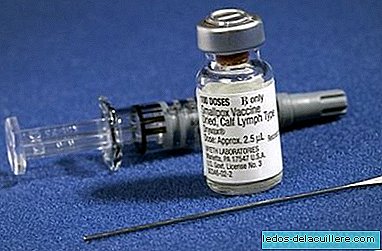
Following our journey through vaccines, through which we have known ten important facts, the consequences of stopping vaccinating our children and their adverse effects, today we see others Frequently asked questions about vaccines with answers from the Spanish Association of Pediatrics.
What are vaccines and how do they work?
Vaccines are biological products that serve to prevent infectious diseases by activating our body to develop specific defenses against them. Vaccines "teach" the immune system to defend itself. For that reason they usually contain part of the microorganism that causes the disease or the whole germ, but is dead or weakened.
After receiving the vaccine, by injection or ingestion, our body produces antibodies against the modified germs it contains. These antibodies will protect us against the true germs that cause the disease, destroying them and causing us not to get sick.
This way of reacting "learned" gives us immunity from future encounters with the aggressor microbe, which will trigger the production of defense antibodies again.
What calendar corresponds to my son?
In Spain there are small calendar differences between the different autonomous communities, although the vast majority of vaccines are common throughout the State. For Spain we can consult the vaccination calendar. In the health center that corresponds to us they will indicate the current pattern in each country or region.
Which vaccines are free and which ones will I have to buy at the pharmacy?
In Spain, all vaccines included in the official calendar of the autonomous community are administered free of charge. The vaccine against rotavirus (temporarily discontinued since June 2010) and also, for the vast majority of communities, that of pneumococcus and chickenpox in young children, which have to be purchased at the pharmacy by indication, are out of this regime medical
In general, mandatory vaccines are included in the costs of the health system in other countries with extended Social Security coverage, such as Spain. In some places there may be vaccination programs that provide vaccines for children in need free of charge.
What should be done in case of delay of any vaccine?
If we have forgotten a vaccine, we must notify the pediatrician, it is probably not too late. Most vaccines can be administered at any age and also, if you had missed a dose it would not be necessary to start over, since the doses administered still count even if more time has passed than advised.
When is the administration of a vaccine contraindicated?
Although you should always check with your nurse / pediatrician, a vaccine is rarely contraindicated. Important febrile processes during the day planned for vaccination may advise its delay, but the only usual real contraindication is the known severe allergy to the vaccine or any of its components.
Vaccines may be given even if your child has a cold or is taking other medicines or may be incubating a disease. Contact with other children or with pregnant women or with women who are breastfeeding does not contraindicate vaccination.
The serious adverse effects produced after vaccination (anaphylactic reactions or encephalopathy, seizures ...) would contraindicate the administration of the following vaccines.
Can I skip the vaccination schedule that corresponds to my child?
This is very important to be clear. In Spain we have very few cases, of the lowest in the world, of diseases that are preventable through vaccines, but this does not mean that these diseases have been eradicated. Many of the viruses and bacteria that produce them are still present in our country and for this reason it is important that children, especially babies and young children, receive the recommended vaccines on time.
In addition, in a society with as much mobility as ours, people from other countries arrive every day or we may travel abroad, including countries where diseases that can be avoided with vaccines are still relatively common today. If vaccines were not used epidemics of preventable diseases could occur again, which would cause higher levels of sequelae, disability and child death.
¿Where can i get more information?
- In Spanish: Calendar recommended by the Spanish Association of Pediatrics 2010, Vaccines ... one by one. Vaccine Advisory Committee of the AEP, Spanish vaccination calendars. AEP Vaccine Advisory Committee, what can I prevent? Spanish Association of Vaccination, Immunization. CDC in Spanish, Vaccine Information - IAC. Information in spanish. The AEP has a contact form.
- In English: Immunization. National Health Service (UK), Immunization (families). American Academy of Pediatrics, Immnunize your child. Public Health Agency of Canada, Immunize Australia Program. In the United States, the National Vaccination Information line for more information is 1-800-232-0233 (Spanish) or 1-800-232-2522 (English).
We hope the answers to these Frequently asked questions about vaccines They have clarified some questions that concern us about the health of our children and help you to continue expanding information.












